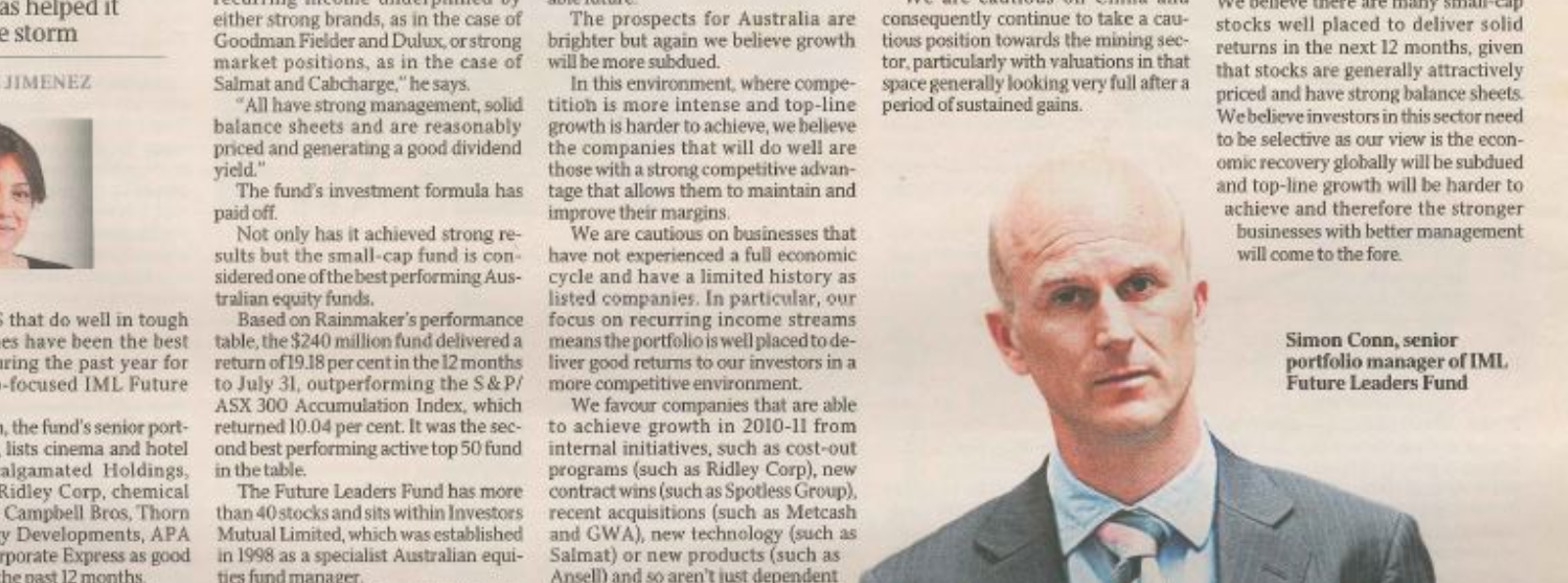IML: 25 years of small-cap investing – and 3 stalwart stocks
Killer robots - or at least, technology that in some way hinders rather than helps – was a standout theme in my recent chat with IML portfolio manager Simon Conn.
Our conversation coincides with the 25th anniversary of the Australian Smaller Companies Fund, which Simon manages along with Lucas Goode. IML, formerly know as Investors Mutual Limited, first opened its doors in June 1998, and Conn is ideally placed to reflect on this impressive milestone, given he’s a quarter-centurion and foundation staffer, having joined when founder Anton Tagliaferro launched IML.
“Small caps have always been perceived as the area where you’ll make a quick buck. I think that’s been accentuated with the rise in quantitative investing and a lot of algos (algorithmic trading platforms) trading based on company upgrades and downgrades," Conn says
.png)
“The noise drives share prices”
Put another way, the bots have shaken up the investing landscape - and not necessarily for the better, explains Conn.
“If there’s a small piece of bad news you can get this massive drawdown because everyone sells on sentiment. There’s much more volatility because of the bots and other short-term participants in the market,” he says.
“That’s where the share prices can detach from what I think is fundamental value.”
This is more pronounced in the small-cap space because it takes lower trading volumes to drive bigger share price movements, both up and down.
He also refers to a greater reluctance by investors to hold onto stocks that see a short-term correction – or to buy on the back of negative sentiment.
“If companies disappoint, people are less likely to withstand that and buy the dip – they just dump the stock," he says.
"In the past, the dividend would provide a level of support but now the market is much more short-term. So, small caps are much more volatile than they were three or four years ago."
.png)
The rise of ETFs
The massive uptake of passive investing – particularly exchange-traded funds – is another big multi-decade shift Conn calls out.
“That’s something I’ve noticed in the last few years in particular, the gap in valuations between those companies that are liquid, that are in the index and are favourites of investors, and those that aren’t,” he says.
He refers to the prevalence of cashed-up institutional investors being able to take longer-term positions. But for the people behind those funds, they must also focus on short-term returns and their performance relative to the index, which further contributes to the gulf in valuations between those companies that are in the index and those that aren’t.
Conn cites the Buy Now Pay Later space as a prime example, where valuations became stretched for several players – Afterpay, for instance – because professional investors essentially had their hand forced when they bought the index.
“No one understood how the sector was going to make money, but many professional investors were in there because it was in the index, and they needed to stay closer to the index performance,” Conn says.
Founder-led businesses
IML and many other fund managers look favourably at such firms, which sometimes trade in excessive multiples largely because of the level of trust investors have in management teams. Conn cites four-wheel-drive parts and accessories distributor ARB as a classic example, “and despite the big pullback recently, it still trades at a big premium to its peers.”
“The premium ascribed to a Wisetech (ASX: WTC), Technology One (ASX: TNE), ARB (ASX: ARB) or Reece (ASX: REH) is very significant compared to the broader market and the other stocks in that sector. That’s a function of liquidity and track record,” he says.
“People are happy buying and holding – or continuing to buy them – regardless of how much of a multiple they’re paying versus today’s earnings.”
How have you continued to sort the good companies from the bad?
The special sauce is in IML’s focus on quality. IML’s definition of quality includes recurring earnings, capable management, with a competitive advantage, trading at a reasonable valuation.
“Even in small caps, you can find companies that are leaders in their field. The Australian economy is quite small and a company can have a strong market position in a reasonable sector – and be a small-cap,” Conn says.
He refers to pathology services provider Australian Clinical Labs (ASX: ACL) as an example, one of the top three in the local sector but still sitting outside the ASX 200.
Conn also emphasises the quality of the management team for underlying businesses, which is even more important at the smaller end of the spectrum. Whereas bigger companies (any of the big four banks for example) tend to have layers of bureaucracy that mean the pointier end of the management chart isn’t necessarily as crucial in creating shareholder value.
Small caps can be more dynamic, where the niches in which the companies operate make the quality of management decisions even more important.
“A well-priced acquisition can add a lot of value, conversely an acquisition where you pay too much or use too much debt on the balance sheet can destroy a lot of value. So, the due diligence process, the cultural alignment…so you want to know the management team is there to make money for everyone and not just themselves.”
Another fundamental of IML’s process is recurring earnings, in finding companies that can be profitable through the cycle, which should mean the share price is less volatile.
“It also should mean the business can generate an income stream by paying dividends, which should provide a level of support to the share price,” Conn says.
Downside protection and lower volatility are also key to your approach – how have you achieved this?
“It’s about the stocks you own," says Conn, emphasising his team doesn't use cash holdings to help smooth volatility.
"We’ve owned stocks like Dulux Group (ASX: DLX), and Amalgamated Holdings, as I spoke about earlier. If they’ve got a good asset backing or domestic franchise, which has that low amplitude recurring earnings – which means even if the economy or the sector is going through a downturn – the company still generates cash," Conn says.
"That level of earnings will always put an underpinning on the share price and should hold it in good stead through more difficult times."
He believes such businesses tend to be less volatile than firms such as mining companies, noting that in this part of the market especially, such companies tend to be “one mine and one commodity. And even producers have no control over the price of their output."
On the other hand, companies like EVT Limited (ASX: EVT) can control the ticket prices they charge customers. And you can charge what you think the market will bear for hotel rooms.”
“That should mean the share price is less volatile and provides that downside protection (to the portfolio),” Conn says.
IML portfolio stalwarts
EVT Limited (ASX: EVT)
This company, previously known as Event Hospitality and Entertainment – and Amalgamated Holdings before that – was held in the IML portfolio for more than 20 years.
“It was a really solid, consistent generator of dividends and capital growth over time as they unlocked the value on the balance sheet and generated strong cashflow from the cinema business while building two hotel brands,” Conn says.
“It was one of the first holdings in the fund and we only sold it two or three years ago.”
Energy Developments Limited
A Queensland-based firm that extracted coal-seam gas for electricity generation, IML bought this company some years before 2015, when it was acquired by infrastructure firm Duet – which has itself been taken out of the market since then.
IML added the stock to its portfolio on the back of a disappointing earnings update, when the stock fell below what they believed it was worth.
“It was a good contributor to the portfolio because it had that recurring income stream…they took gas and sold it as electricity, which is a pretty obvious and simple business, but it had good contracts on the gas supply side and always generated consistent cash,” Conn says.
Credit Corp Group (ASX: CCP)
Within the Financial sector, IML bought the debt purchase, collections, and consumer lending firm when it first floated on the ASX at around 50 cents.
CCP is now a $1.5 billion market cap business that trades at $21 a share as of 17 July. IML bought the firm “because it was a good little business, we liked the debt acquisition business, it was a relatively new industry in Australia at the time and it had a disciplined approach to acquisitions,” Conn says.
“This company has a history of generating good returns from buying ledgers from the banks, a solid founder-led business.”
As Conn explains, from the 50-cent level, his team rode the stock up to around $10, where they started taking profits before selling out of the company when it hit around $14 in 2018/2019.
Access a compelling group of Australian small caps
The Investors Mutual Australian Smaller Companies Fund provides exposure to an actively managed portfolio of quality shares outside of the top 100 listed on the ASX. You can learn more by exploring the fund profile below.

1 topic
8 stocks mentioned
1 fund mentioned
2 contributors mentioned

